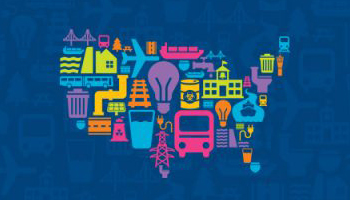While the House passed their bills earlier this year, Senate Appropriators this week introduced all 12 spending bills for fiscal year (FY) 2021. These spending bills come as Congress enters the lame-duck session and need to avert a potential government shutdown as we near the December 11 deadline.
While House Appropriators included COVID-19 supplemental funding, the Senate Appropriations Subcommittee on Transportation, Housing, and Urban Development FY21 appropriations bill did include $87 billion for the U.S. Department of Transportation (DOT), but not explicit supplement funding to battle the pandemic. Furthermore, the Senate THUD bill includes $1 billion for the Better Utilizing Investments to Leverage Development (BUILD) grant program, which is $3 billion less than the House bill, but on par with FY20 enacted funding level. The Capital Investment Grant (CIG) program would receive $1.8 billion in the Senate bill, which is less than the combined $7.2 billion included in the House bill, but also on par with FY20 enacted levels. In addition to $3.35 billion already included, the Airport Improvement Program (AIP) received an additional $400 million which is $100 million less than the House bill and on par with FY20 enacted levels. Lastly, the legislation includes maintaining overall core FAST Act funding at authorized levels.
The Senate Appropriations Subcommittee on Homeland Security’s FY21 appropriations bill includes $263 for the Federal Emergency Management Agency’s (FEMA) Flood Hazard Mapping and Risk Analysis program, which is the same as the House bill and in line with the FY20 enacted funding level. It also includes $14 million for the High Hazard Potential Dam Rehabilitation Program, which is a $4 million increase from the current FY20 funding level, but still falls short of its $60 million authorization.
The Senate Appropriations Subcommittee on Interior and Environment’s FY21 appropriations bill funds the U.S. Environmental Protection Agency (EPA) at $9.09 billion – which is slightly less than the House bill. It provides $1.63 billion for the Clean Water State Revolving Fund program and $1.12 billion for the Drinking Water State Revolving Fund program, which is the same as the House bill and on par with programs’ FY20 enacted funding levels. The Senate bill also includes $60 million for the Water Infrastructure Finance & Innovation Act (WIFIA) program, which is more than the House bill (which had zeroed the program out) and on par with the program’s FY20 funding level. The report recommends that the agency prioritize WIFIA loans for projects that address lead or per-and polyfluoroalkyl substances (PFAS). Finally, the bill provides $3.1 billion for the National Park Service, which is slightly less than the House bill but a small increase above the FY20 enacted level.
The Senate Appropriations Subcommittee on Energy and Water’s FY21 appropriations bill funds the U.S. Army Corps of Engineers’ (USACE) Construction account at $2.6 billion, which is the same as the FY20 enacted funding level. The bill meets the spending targets set forth by authorizers for the Harbor Maintenance Trust Fund, which is a $50 million increase above the FY20 enacted level, and it makes full use of the estimated annual revenues from the Inland Waters Trust Fund. It funds USACE’s Water Infrastructure Finance & Innovation Act (WIFIA) program with $22.8 million for the maintenance, upgrade, or repair of dams. The bill also funds the U.S. Department of Energy (DOE) at $42 billion, a $3.8 billion increase over the FY20 funding level.
Lastly, the Senate Appropriations Subcommittee on Commerce, Justice, Science, and Related Agencies FY21 appropriations bill includes $8.5 billion for the National Science Foundation, $23.5 billion for the National Aeronautics and Space Administration (NASA), and, within the Department of Commerce’s $9.6 billion, the measure allocates $1 billion for the National Institute of Standards and Technology (NIST), $340 million for the Economic Development Administration (EDA), and $5.4 billion for the National Oceanic and Atmospheric Administration (NOAA).
With only four weeks before a potential government shutdown, now is the time for action. We urge lawmakers from both side of the Capitol to work in a bipartisan manner before funding expires on December 11th to ensure that our nation’s infrastructure receives the funding required to maintain and modernize our systems.
Sign Up For Email Updates
Select your home state, and we'll let you know about upcoming legislation.
"*" indicates required fields
